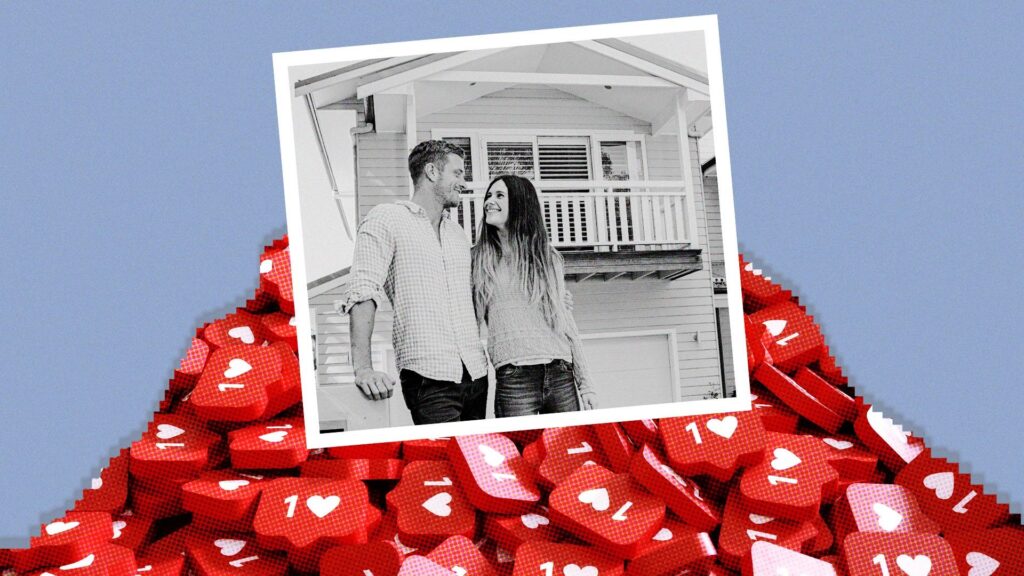
Photo-illustration by Realtor.com. Source: Getty Images
“I own a home.”
These four simple words can now seem like an all-out brag to some people.
Given the current real estate environment, it will be no surprise that homeownership is becoming quite the status symbol. In fact, a good mortgage rate is said to be the latest humble brag, shared at house parties and social events.
Some people even post their homeownership status in their dating profiles.
If you look no further than Reddit, you’ll find a forum filled with countless testy posts from detractors.
“What is with all of the profiles identifying that they are a ‘homeowner’ or ‘have a mortgage’?” posts UWSrunner, who identifies herself as a 31-year-old woman from the Washington, DC, area. “It seems very odd/off-putting. … Are we supposed to applaud you for ‘adulting’?”
So, when did homeownership become a badge of affluence? And what does bragging about it achieve? What the experts and regular folks have to say might surprise you.
Homeownership as a status symbol
Homeownership has been the adult, wealth-building “brass ring” for as long as it has been attainable for middle-class Americans.
By the late 1940s, being able to purchase your own affordable “starter home” was key to achieving the American dream. Buying a house became a symbol of social mobility, a sign that you were solidly middle class—and climbing the wealth ladder.
After the 1950s, buying a home, while not exactly easy, was an achievable dream for many Americans of all classes.
How real estate got out of reach
Real estate has always been volatile, as evidenced by the sky-high mortgage rates in the 1980s (hello, 18.63%) and the housing crisis of 2007–08.
Yet, in just the past few years, housing market headwinds—with wallet-busting housing costs, low home inventory, and mortgage interest rates the highest they’ve been in years—have made homebuying that much harder.
In 2021, a homebuyer with a 20% down payment and a 2.5% mortgage interest rate on a 30-year loan for a $500,000 home would have been looking at a $1,975 monthly mortgage payment.
Fast-forward to today, with mortgage interest rates hovering around 7%, and that last figure rises to a hefty $3,056.
Why homeownership can annoy renters
Mortgage rates are predicted to stay relatively high, and some buyers fear they’ve missed their opportunity.
So you can see why talking about being a homeowner and having a low mortgage interest rate would rankle buyers stuck on the sidelines.
Thus, the humble brag that intends to impress elicits envy instead.
It’s even more painful when the home in question was purchased in the “before times”—before and during COVID-19, when home prices hadn’t peaked yet and when interest rates were at historic lows.
Humble brag or smart cookie?
To see how the homeowning humble brag plays out, we looked at how it affects a potential partner.
For Susan, 48, from Kansas, seeing a potential date has a home certainly doesn’t hurt.
“I am a busy, single mom who occasionally goes on dating sites,” says Susan. “I prefer a man that is a homeowner, and those statements don’t bother me! It conveys responsibility and that they have put roots down.”
Jeremy, 27, from Pennsylvania, thinks it could go either way.
“They may be looking to convey responsibility or gloat about owning a home as well,” he says.
“Like it or not, one’s dating profile is competing with all other dating profiles, and everyone is trying to find a way to stand out from the rest,” says Kevin Darné, author of “Pump Your Brakes: How To Stop Having Bad First Dates.”
But it might say as much about the values of the braggart as it does about their wannabe love match.
Why do people humble-brag?
Humble bragging is a form of self-promotion, make no mistake. Even though the braggarts are phrasing it in a way that sounds almost like a complaint, they are offering some facts that they believe will make you think more highly of them.
Yet, humble bragging is more likely to have the opposite effect, according to researchers who have studied the social phenomenon.
Övül Sezer, assistant professor of management and organizations at Cornell University, studies what she terms “impression (mis)management.” That is, the mistakes people make when trying to impress others.
Sezer, who led a team of researchers studying humble bragging, has learned that a brag wrapped in a complaint or false humility is perceived as worse than bald self-promotion.
“The proliferation of humble bragging in social media, the workplace, and everyday life suggests that people believe it to be an effective self-promotion strategy. Yet we show that people readily denigrate humble braggers,” according to Sezer.
Let’s face it: Some people respond negatively to bragging of any kind.
But all people from all walks of life are likely to find humble bragging even worse, according to Sezer’s research. Because, in addition to seeming insecure, humble braggarts also sound insincere.
The better way to impress people
If you bought a great home for a sweet price and snagged a low rate, you are indeed one to be envied in these harsh housing market conditions.
So, what would work better if bragging doesn’t make people like you, and humble bragging can make them actively dislike you?
Sincerity.
When you’re talking to people, wait until you’ve established a connection and let homeownership come up naturally in the conversation. At that point, honestly revealing your lucky status will be icing on the cake.
The post Homeownership Is the Latest Humble Brag—but You May Want To Keep It to Yourself appeared first on Real Estate News & Insights | realtor.com®.
